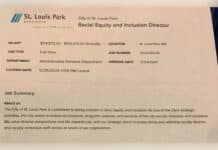The election contest between State Rep. Brad Tabke, DFL-Shakopee, and Republican Aaron Paul may end up being resolved by the Minnesota House of Representatives. At least, that’s what could occur if the issue is not settled before the state legislature convenes next year.
Last Friday, Tabke’s legal team filed a response to an election contest lawsuit brought by Paul regarding the election results in District 54A of the Minnesota House of Representatives.
The election in District 54A proved to be one of the closest elections in Minnesota this year. After a recount was conducted, Tabke led Paul by just 14 votes in the race for the Scott County legislative seat.
However, the race has been shrouded in controversy since Scott County officials disclosed that 20 absentee ballots were “properly accepted” for counting, should have been counted, but were not counted. Additionally, the county said that those 20 ballots were likely “thrown away” and “likely will not be recovered.”
Given the aforementioned situation, Paul filed what is known as an election contest lawsuit. In that lawsuit, the Republican candidate said the court should declare the election invalid, recommend that the House refuse to seat Tabke, and declare that a vacancy exists for the seat which would allow for a special election.
Brad Tabke’s response to the election contest lawsuit
Primarily, the response from Tabke argued that the court does not have the authority to invalidate the election in House District 534A. According to Tabke’s legal team, Minnesota law does not allow the court to declare the election invalid because only the Minnesota House of Representatives can judge the election returns of its own members.
Article IV, Section 6 of the Minnesota Constitution states that “Each house shall be the judge of the election returns and eligibility of its own members.”
Furthermore, Tabke argued that even if the ballots were counted, the chance that they would allow Paul to gain enough votes to win the election is unlikely because the 20 missing ballots were from Shakopee Precinct 10; Tabke won Precinct 10 with 57.74% of the vote compared to Paul’s 42.18%.
“Indeed, there is only a 0.0005% chance that the counting of the missing ballots would result in [Paul] gaining a net of at least 14 votes,” wrote Tabke’s legal team.
“Moreover, although [Paul] asserts that question of who received the most votes is unresolvable, Tabke is confident that the evidence introduced in the election contest will leave no doubt that he won the election.”
In his answer, Tabke also pushed back against statements made by Paul’s legal team which alleged that Scott County election officials deliberately failed to comply with Minnesota election law.
Earlier today, a conference was held which set forth the schedule for hearings in the election contest. Another hearing is set for next Monday.
How the situation may be resolved
Minnesota Statute 209.10 does allow the judge presiding over the election contest lawsuit to investigate, hear testimonies, issue appropriate orders, make findings of facts, and decide the contest. A report containing those records would then be transmitted to the Minnesota Legislature on the first day of the legislative session.
However, that statute is not a limitation on the legislature’s constitutional power to judge the election returns and eligibility of its own members.
As previously mentioned, Article IV, Section 6 of the Minnesota Constitution states that “Each house shall be the judge of the election returns and eligibility of its own members.” In short, this means that the Minnesota House gets the final say in resolving disputes related to the elections of its members.
When deciding an election contest in the Minnesota Legislature, both parties will present their evidence before the chamber in which they are seeking to serve. Afterwards, the members of that chamber will hold a voice vote to decide the election contest. If one of the parties is a member of the chamber, they are not permitted to vote on the matter.
Furthermore, the law states that “a majority of the votes given decides the issue.”
As such, Tabke will not be able to vote on his own election contest if the matter comes to a vote in the House. This would mean that there would be 67 voting Republicans and 66 voting Democrats. Given this reality, Republicans appear to have the votes to decide the election contest themselves.
A previous version of this story said Tabke argued that only the Minnesota House can resolve the election dispute. Instead, Tabke has argued that the election cannot be invalidated by the district court overseeing the election contest lawsuit.
















